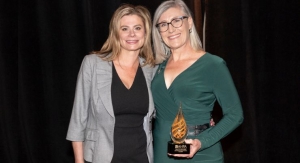06.01.11
More than 25% of American women are focused on and proactive about their health and well-being, according to the “Life…supplemented” My Wellness Scorecard National Study. In addition, nearly three-quarters of American women try to live a healthy lifestyle, but often miss the mark. Ranked on a scale from “AlphaWELL” (those who are extremely proactive and meticulous about their health) to “OhWELL” (those who do little to nothing about maintaining their health), participants were evaluated on their overall wellness regimen—maintaining a healthy diet, taking supplements, getting routine exercise and other general lifestyle habits. Only 1% of women are AlphaWELLs and 26% are WELLs, while 42% and 31% are WannabeWELLs and OhWELLs, respectively. The study suggests that while women want to be well, they need help to achieve their goals.
“The average woman wears so many ‘hats’ that she often neglects taking adequate time for herself,” said Cheryl Forberg, RD, registered dietitian for “The Biggest Loser” and consultant to the “Life…supplemented” campaign. “Women need to invest in themselves. If they spend just a little time evaluating their overall well-being, it is easy to develop healthy habits that can last a lifetime.”
According to the My Wellness Scorecard National Study, 58% of women report doing a fairly good job of avoiding processed foods, watching what they eat when it comes to cholesterol-rich dishes and avoiding fatty foods like whole milk and fatty meat. However, nearly 35% admit they eat more cholesterol-rich and fatty foods than they should.
When it comes to vitamins and other dietary supplements, 61% of women take a multivitamin. However, only 46% of women say they take a multivitamin daily. Regular exercise is extremely important, and 48% of women say they “enjoy cardiovascular exercise like running, walking, aerobics, dancing, tennis and basketball.” However, 41% of women say they don’t have a regular exercise regimen.
Another recent survey found that women are also struggling to cope with arthritis and often feel they receive less support than their spouses. In addition, co-workers offer more support than family members. These findings came from Flexcin International, Inc., Fort Myers, FL, manufacturer of degenerative joint supplements for people and pets. A proceeds sponsor of the Arthritis Foundation, Flexcin sought to understand the level of awareness and support from the network of friends and family of someone living with arthritis.
The company’s research division conducted a national online survey throughout April and received responses from 1350 people who all have some form of arthritis—e.g., osteoarthritis, psoriatic arthritis, rheumatoid arthritis, gout, lupus—or other joint-related pain, illness or disability. Information and feedback from the survey will be used to develop future communications and outreach programs for people with a form of arthritis.
In households where only one spouse has a form of arthritis, more than 78% of women feel they receive little or no support; nearly 66% of men said they are satisfied with support. More than half of respondents still working (56%) said they feel co-workers offer a higher level of support and overall awareness compared to that of family members. About 67% of respondents said other members of the household are never or only occasionally aware of their arthritis, while about 64% of respondents said others in the household never or rarely take an interest in their daily issues with arthritis. A majority of respondents (58%) said their arthritis hurts the most when cleaning and doing household chores.
“Flexcin believes a strong support network can significantly help a person coping with degenerative joints,” said Tamer Elsafy, CEO and founder of Flexcin International. “It’s important for other people to be aware of certain issues arthritis sufferers deal with on a day-to-day basis to increase the amount of support offered.”
“The average woman wears so many ‘hats’ that she often neglects taking adequate time for herself,” said Cheryl Forberg, RD, registered dietitian for “The Biggest Loser” and consultant to the “Life…supplemented” campaign. “Women need to invest in themselves. If they spend just a little time evaluating their overall well-being, it is easy to develop healthy habits that can last a lifetime.”
According to the My Wellness Scorecard National Study, 58% of women report doing a fairly good job of avoiding processed foods, watching what they eat when it comes to cholesterol-rich dishes and avoiding fatty foods like whole milk and fatty meat. However, nearly 35% admit they eat more cholesterol-rich and fatty foods than they should.
When it comes to vitamins and other dietary supplements, 61% of women take a multivitamin. However, only 46% of women say they take a multivitamin daily. Regular exercise is extremely important, and 48% of women say they “enjoy cardiovascular exercise like running, walking, aerobics, dancing, tennis and basketball.” However, 41% of women say they don’t have a regular exercise regimen.
Another recent survey found that women are also struggling to cope with arthritis and often feel they receive less support than their spouses. In addition, co-workers offer more support than family members. These findings came from Flexcin International, Inc., Fort Myers, FL, manufacturer of degenerative joint supplements for people and pets. A proceeds sponsor of the Arthritis Foundation, Flexcin sought to understand the level of awareness and support from the network of friends and family of someone living with arthritis.
The company’s research division conducted a national online survey throughout April and received responses from 1350 people who all have some form of arthritis—e.g., osteoarthritis, psoriatic arthritis, rheumatoid arthritis, gout, lupus—or other joint-related pain, illness or disability. Information and feedback from the survey will be used to develop future communications and outreach programs for people with a form of arthritis.
In households where only one spouse has a form of arthritis, more than 78% of women feel they receive little or no support; nearly 66% of men said they are satisfied with support. More than half of respondents still working (56%) said they feel co-workers offer a higher level of support and overall awareness compared to that of family members. About 67% of respondents said other members of the household are never or only occasionally aware of their arthritis, while about 64% of respondents said others in the household never or rarely take an interest in their daily issues with arthritis. A majority of respondents (58%) said their arthritis hurts the most when cleaning and doing household chores.
“Flexcin believes a strong support network can significantly help a person coping with degenerative joints,” said Tamer Elsafy, CEO and founder of Flexcin International. “It’s important for other people to be aware of certain issues arthritis sufferers deal with on a day-to-day basis to increase the amount of support offered.”



























